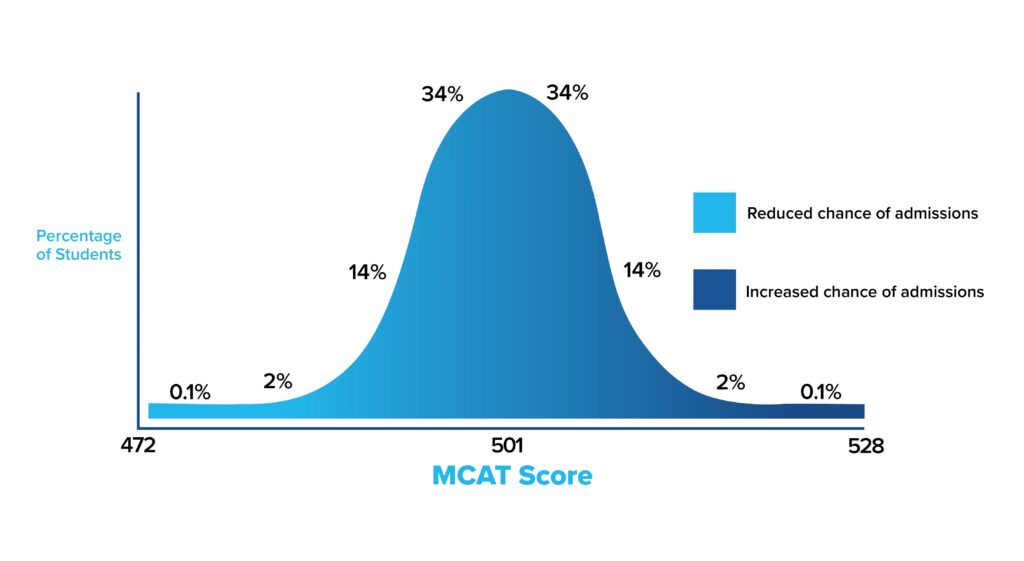
For premed students trying to decide on the next step in their med school journeys, standardized admissions tests are a fact of life. Inevitably, you’ve thought about the GRE vs MCAT at least once when thinking about what exam to tackle for medical school admission.
Understanding the differences between the GRE and MCAT is crucial. We’ll try to cover the most important ones in this guide to help you decide which exam is right for you.
Table of Contents
- Purpose and Focus
- Content and Structure
- Scoring Systems
- Preparation Time
- Flexibility and Cost
- Acceptance Rates
- Which Exam Should I Choose?
GRE vs MCAT: What’s the Difference?
Purpose and Focus
The GRE (Graduate Record Examination) is a general test designed for admission into graduate programs. This includes MBA programs, MFA programs, and more.
Since it’s meant to be used across various disciplines, it tests a broader scope of skills. The GRE assesses verbal reasoning, quantitative reasoning, critical thinking, and analytical writing skills. It serves as a measure of preparedness for graduate-level academic work.
The MCAT, on the other hand, is specialized and tailored for medical school admissions. It evaluates knowledge in biological, chemical, social, and physical sciences, alongside critical analysis and reasoning skills. This focus highlight’s the MCAT’s role in assessing readiness for the rigors and challenges of medical school and a career in medicine.
Content and Structure
GRE
The GRE consists of three main sections:
- Verbal Reasoning
- Quantitative Reasoning
- Analytical Writing
The GRE has 54 questions, plus one “Analyze an Issue” writing task. Test takers have about two hours to complete the GRE. Each section aims to test a student’s ability to analyze and evaluate written material, understand and analyze quantitative data, and support ideas with reasoning and examples.
MCAT
The MCAT is divided into four sections:
- Biological and Biochemical Foundations of Living Systems
- Chemical and Physical Foundations of Biological Systems
- Psychological, Social, and Biological Foundations of Behavior
- Critical Analysis and Reasoning Skills
Additionally, you will be asked to demonstrate four different scientific inquiry and reasoning skills on the MCAT, including:
- Knowledge of scientific concepts and principles
- Scientific reasoning and problem-solving.
- Reasoning about the design and execution of research.
- Data-based and statistical reasoning
From beginning to end, the MCAT has 230 questions and takes about 7.5 hours to complete. Unlike the GRE, the MCAT’s content is heavily skewed towards scientific knowledge and reasoning, making it more relevant and challenging for aspiring medical students.
In other words, the content and skills tested on the MCAT will likely come up again in medical school or in your career as a doctor.
Further Reading
Scoring Systems
The GRE scores the Verbal Reasoning section and Quantitative Reasoning section on a scale of 130-170, in one-point increments. The Analytical Writing section is scored from 0 to 6.
Each section receives its own score and each scaled score (from 130-170) has a percentile rank. Your percentile rank shows how your score compares to other test takers.
In contrast, the MCAT scores each of its four sections from 118 to 132. The scores are added together to give you a total score ranging from 472 to 528.
MCAT scores also include percentile ranks. The percentile rank provides a mean of comparing your total score to that of other MCAT test takers within the same testing year.
A high MCAT score can transform you into a more competitive medical school applicant, giving you an edge in med school admissions.
Further Reading
Preparation Time
One big difference when looking at the GRE vs MCAT is how long it takes to get ready for each exam.
Preparation time for the MCAT is typically longer, given its comprehensive focus on sciences. MCAT students often dedicate three to six months or more to studying for the MCAT, utilizing a range of resources from textbooks, video modules, flashcards, practice questions, and practice exams.
To organize the massive ecosystem of MCAT prep materials, an MCAT prep study plan is necessary for all students.
The GRE, while still demanding significant study time, generally requires less preparation, with students spending an average of one to three months preparing.
Free MCAT Resources
Flexibility and Cost
The GRE and the MCAT can be taken at designated test centers and sometimes in the same room. But that’s where the similarities end.
The GRE can be taken at a test center or at home with exam dates happening throughout the year. The registration fee is $220, plus a $50 rescheduling fee (if needed).
You can take the GRE once every 21 days and up to five times within a continuous 12-month period.
On the other hand, you must take the MCAT at a testing center. MCAT test dates occur in January and March, then April through September. The MCAT registration fee is $335, with rescheduling fees between $50 and $200.
You can take the MCAT up three times in a single testing year, four times over two consecutive years, and up to seven times in your lifetime.
It’s also worth noting that your chosen MCAT test date significantly impacts your medical school application and admissions chances. A test date too late in the admissions cycle can delay your application or prevent you from retaking the MCAT, if necessary
Sign up to get expert tips and exclusive invites to free MCAT classes and medical school admissions workshops!
GRE vs MCAT: Med School Acceptance Rates
Data on acceptance rates for applicants who have taken the GRE vs MCAT for medical school is nuanced. There are a very small number of medical schools that accept GRE scores, primarily for dual-degree programs.
While there are medical school programs that don’t require the MCAT at all, most do. In fact, your medical school applications won’t be complete without a valid MCAT score.
Consequently, students submitting MCAT scores have a broader range of medical schools to apply to. There is also data on high MCAT scores in correlation to acceptance rates.

Based on data from the AAMC, we can estimate that a medical school applicant’s chance of admission increases the higher their MCAT score is. However, no MCAT score can guarantee admission.
Which Exam Should I Choose?
We’re back at square A: GRE vs MCAT; which one should you choose?
The fact is, if you’re pursuing a career in medicine, the MCAT is the clear choice. It’s tailored to assess the skills and knowledge necessary for medical school and is universally accepted by medical schools.
Taking the GRE instead may limit your options and could necessitate additional steps to prove your readiness for a medical program. In some cases, it may even be a waste of time if the medical schools on your list don’t even accept it.
However, for those exploring multiple graduate paths or considering dual-degree programs (e.g., MD/Ph.D., MD/MBA) that might accept/require the GRE, it is worth considering.
Ultimately, acceptance into medical school is more than just your MCAT scores. It’s a holistic process that includes your personal statement, letters of recommendation, GPA, and your activities.
Likewise, success in medical school cannot be determined by any standardized test. However, the journey to medical school is competitive, so you want to give yourself as many advantages as you can.
Final Thoughts
Choosing between the GRE vs MCAT is not just about selecting a test. It’s about strategizing your next move in your journey toward medical school.
The MCAT, with its specialized focus and direct relevance to medical school curricula, stands as the key to unlocking those doors. Remember, your decision is not just about getting into medical school but laying the groundwork for a successful, impactful career in medicine.
Once you’re ready to begin your MCAT prep, we can help! Blueprint MCAT students successfully navigate the MCAT and increase their scores by 15 points, on average.
Whether you need the flexibility of a Self-Paced Course, the instruction of a Live Course, or 1:1 attention of a private MCAT tutor, we have the MCAT prep option that works for your learning style!
Ready to start on the path toward your MCAT score increase? Get access to tons of free MCAT resources today when you create a free Blueprint MCAT account!
Search the Blog

Free Consultation
Interested in our Online MCAT Course, One-on-One MCAT Tutoring or Med admissions packages? Set up a free consultation with one of our experienced Senior Student Advisors.
Schedule NowPopular Posts
-
MCAT Blog What's on the MCAT?
-
MCAT Blog How to Review MCAT Full Lengths

Free MCAT Practice Account
Need great MCAT practice?Get the most representative MCAT practice possible when you sign up for our free MCAT Account, which includes a half-length diagnostic exam and one of our full-length MCAT practice exams.
Learn More







